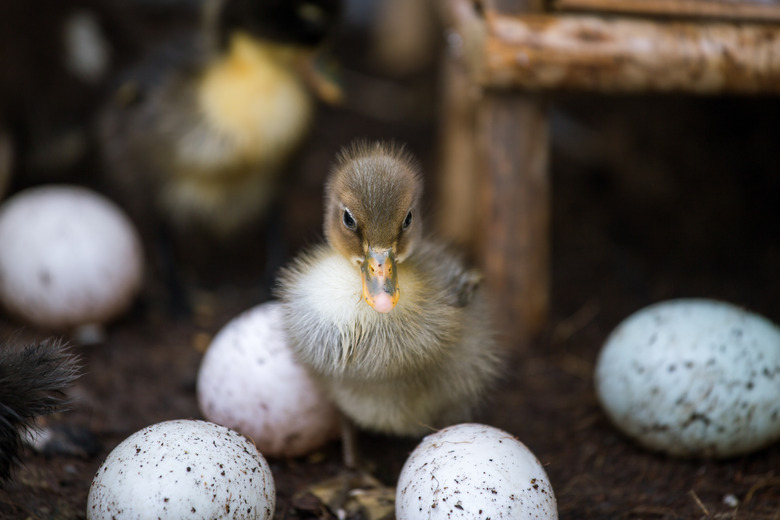What Is The Incubation Period For Duck Eggs?
To incubate means to maintain a set temperature. Incubation of a duck egg is the time period between when the egg is warmed to the correct temperature after laying and when it hatches. Incubation is the period of development of the embryonic duck inside the egg.
The Facts
The Facts
According to the Department of Animal Science at Oklahoma State University, most domestic duck species, such as Pekin duck, incubate for 28 days to hatching. Muscovy ducks take 35-37 days.
Time Frame
Time Frame
Wild ducks also incubate their eggs for about 28 days. Since it takes the female duck several days to produce all her eggs, she will not begin "sitting" on the nest to incubate the eggs until the last egg has been laid, to ensure they hatch around the same time as each other.
Considerations
Considerations
Melvin L. Hamre, an animal scientist at the University of Minnesota Extension Office, says that the eggs must be turned 3 to 5 times daily, up to three days before they hatch. Duck eggs may require higher humidity than chicken eggs while incubating, and may do well with a daily sprinkling of lukewarm water. This increases the loss of moisture across egg membranes, allowing for a larger air pocket inside the egg.
Theories/Speculation
Theories/Speculation
Some experts say duck eggs hatch better in stiff-air incubators than in forced-air incubators.
Expert Insight
Expert Insight
Duck embryo development can be put on "hold" for about a week prior to incubation by keeping the eggs at 55-60 F (13-15 C). Embryo development does not begin until the egg is warmed to the correct temperature. The incubation period begins once the egg reaches the proper temperature of 99.5 F (37.5 C).
Cite This Article
MLA
Schaub, Kelly. "What Is The Incubation Period For Duck Eggs?" sciencing.com, https://www.sciencing.com/incubation-period-duck-eggs-5074884/. 22 November 2019.
APA
Schaub, Kelly. (2019, November 22). What Is The Incubation Period For Duck Eggs?. sciencing.com. Retrieved from https://www.sciencing.com/incubation-period-duck-eggs-5074884/
Chicago
Schaub, Kelly. What Is The Incubation Period For Duck Eggs? last modified March 24, 2022. https://www.sciencing.com/incubation-period-duck-eggs-5074884/
